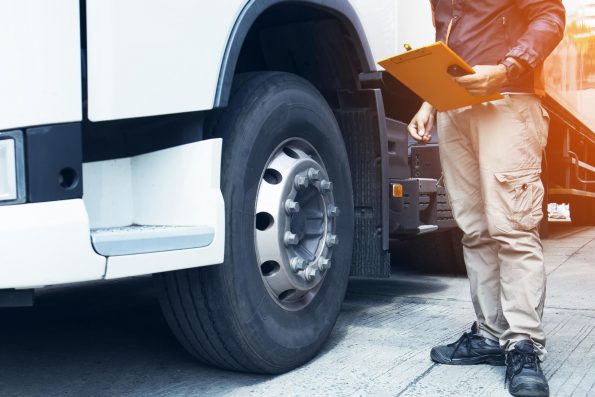Making sure your truck is fit for the road is something you’ll do every day as part of your pre-drive check. This allows you to pick up obvious problems and to spot developing problems before they become serious. A driver will have a routine to ensure they cover off all the areas. Where you start is up to you.
Inside the truck’s cab
- Start the engine and check that all the warning lights go off on the dashboard.
- Clean your windows and mirrors and check they are adjusted correctly. Is your view out of the front window unimpeded? Do you need any washer fluid?
- Push the brake pedal – does it feel like there is pressure? You’ll check this as you leave, too.
- Does the horn work?
- Try the steering wheel – does it have too much ‘play’?
- Do all the lights and indicators work? (You will need to get out and check these)
- Stow any loose items that might roll around in the footwell or that might fly forward if you have to stop quickly.
- Does any auxiliary equipment work?
- Is your documentation up-to-date?
Outside the truck’s cab
Start from the front as you’ll be getting out of the driver’s side of the cab. Walk around the front.
- Are the lights working?
- Is the number plate clean?
- Are there any fuel or oil leaks evident under the cab?
- Are the mudflaps and spray suppression in good condition?
- Are the wheel nuts tight?
- Are the brake lines and electrical connectors connected (if you’re towing a trailer)?
- Is the trailer coupling in good condition and connected correctly?
- Are the tyres in good condition – no cuts or bulges in the sidewall, all properly inflated, nothing trapped in the tread.
- Are any side lights working?
- Is the battery secured?
- Are the fuel caps tight?
- Is there excessive smoke coming from the exhaust?
- Is the engine unusually rattly or noisy?
- Are there any other rattles or noises that could mean something is loose?
- Are aerodynamic aids in good order?
- Are reflectors on the side and back clean?
- Is the load secure? Check the lashings and locks.
- Are there any other attachments or any auxiliary equipment that you need to check, e.g. a truck-mounted crane (this is usually a weekly task).

